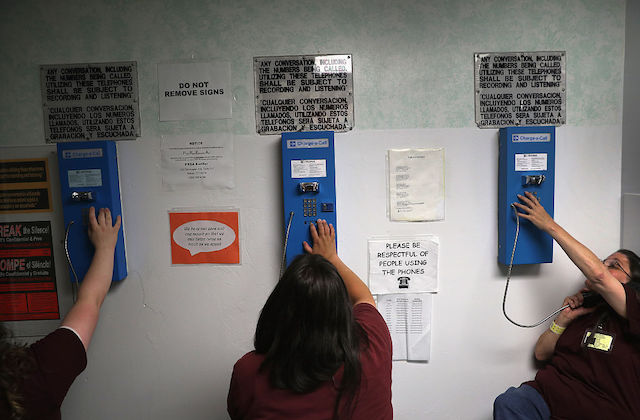A group of 64 civil and human rights organizations on Tuesday (April 7) urged the Federal Communications Commission (FCC) to give incarcerated people access to free phone calls, which would allow them to stay connected to family members amid the COVID-19 crisis, according to a statement from human rights group MediaJustice.
Groups including MediaJustice, the American Civil Liberties Union (ACLU) and Color of Change sent a letter to FCC Chairman Ajit Pai requesting that he ask communications companies serving prisons and jails to join his agency’s “Keep Americans Connected” initiative and offer 60 days of free telephone and video calls for incarcerated people. So far 500 companies have agreed to join Pai’s initiative, which aims to “ensure that Americans do not lose their broadband or telephone connectivity” during the pandemic." However, according to MediaJustice, “only one small prison phone company has joined this commitment.”
The FCC letter reads in part:
During the COVID-19 pandemic incarcerated and detained individuals are being deprived of family visits across the country in conditions that make them uniquely at risk to contracting COVID-19. As such we urge the Federal Communications Commission (FCC) to immediately:
rnt
- Request predatory prison phone companies offer free phone and video calls with no fees to incarcerated and detained individuals immediately for the next 60 days;
rnt
- Press the prison phone industry to commit to the Keep Americans Connected Pledge;
rnt
- Deny Securus’ and all [prison communication] companies’ request to stop paying into the Universal Service Fund
rn
“For the past decade, predatory prison phone companies have raked in billions from families desperate to keep in contact with their loved ones,” said MediaJustice campaign director Myaisha Hayes in the statement. “In light of this global pandemic, in-person visitations have been dramatically reduced or suspended, forcing families to pay exorbitantly high prison phone rates to confirm the safety and well-being of their loved ones. This is exploitation and is unacceptable. It’s time for the FCC to finally step in and protect families.”
As Colorlines previously reported, lucrative prison phone contracts prey on incarcerated people and pretrial detainees in particular.
Bianca Tylek, executive director of human rights group Worth Rises, said that these predatory companies must be called out and stopped. “Just when we think they have exhausted all the ways to prey on incarcerated people and their families, prison telecom corporations shock our consciences with new ones,” she said in a statement. “Their brazen request for emergency relief from paying their fair share to support low-income families with telecom services and grossly inadequate solutions for connecting families and their incarcerated loved ones make a mockery of the stress that COVID-19 has imparted on these vulnerable families. It’s predatory and it’s shameful, but FCC Chairman Pai can and must put pressure on them to make all prison and jail communication free.”
The letter filed with the FCC adds:
Incarcerated people are not able to socially distance while inside and therefore are most vulnerable to contracting COVID-19. Moreover, in conditions where communications are limited, unjust practices may occur because incarcerated people are unable to communicate about the dangerous crowding or lack of access to medical care. Adequate communications are a matter of civil rights and public health.
Justice-involved families in areas most at-risk for the virus with limited access to health care are more disconnected than ever from loved ones. Predatory prison call rates, which could cost over $1 a minute, and exploitative charges for video calls have forced families to choose between needs—like food and power—and regular contact. This problem is further exacerbated as low-wage workers are losing their jobs.
As of press time, the FCC has not responded to the advocates’ letter.
